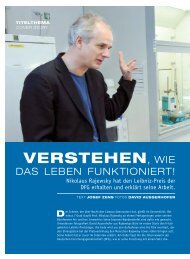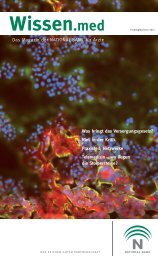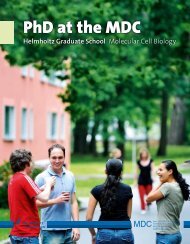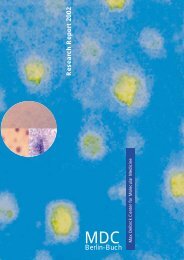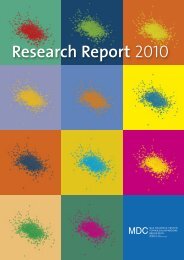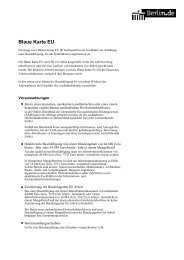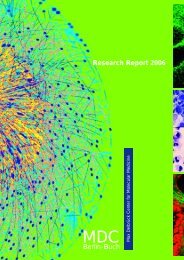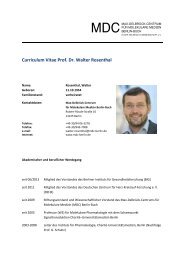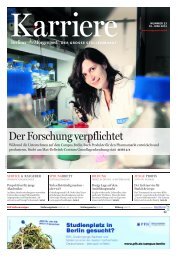to download our flyer - MDC
to download our flyer - MDC
to download our flyer - MDC
You also want an ePaper? Increase the reach of your titles
YUMPU automatically turns print PDFs into web optimized ePapers that Google loves.
PhD Program<br />
• 3-year advanced training in the fields of cell signaling,<br />
gene regulation, and quantitative biology<br />
• Exciting research projects and dual men<strong>to</strong>ring by senior<br />
scientists from Germany and Israel<br />
• Regular thesis committee meetings<br />
• Prolonged exchange visits in a partnering labora<strong>to</strong>ry<br />
abroad<br />
• Annual scientific symposia and thematic summer/winter<br />
schools<br />
• Transferable skills c<strong>our</strong>ses <strong>to</strong> support personal career<br />
development<br />
• The entire program is taught in English<br />
How To Apply<br />
We invite applicants from all countries holding or expecting<br />
<strong>to</strong> obtain a MSc degree including a scientific research thesis<br />
in relevant fields of study.<br />
The German-Israeli Helmholtz Research School accepts<br />
new PhD students twice per year. Interviews take place in<br />
Berlin in spring and fall.<br />
More information and the online application form can be<br />
found at http://www.mdc-berlin.de/application<br />
Contacts<br />
Germany<br />
Prof. Claus Scheidereit, PhD<br />
Spokesperson<br />
Head of Cancer Division<br />
Max Delbrück Center for Molecular Medicine, Berlin<br />
Sabine Löwer, PhD<br />
Scientific Coordina<strong>to</strong>r<br />
Max Delbrück Center for Molecular Medicine, Berlin<br />
E-Mail: signgene@mdc-berlin.de<br />
Israel<br />
Prof. Amit Meller, PhD<br />
Spokesperson<br />
Professor of Biomedical Engineering<br />
Technion - Israel Institute of Technology, Haifa<br />
Prof. Yaakov Nahmias, PhD<br />
Spokesperson<br />
Head of Bioengineering Program<br />
Direc<strong>to</strong>r, Center for Bioengineering<br />
The Hebrew University of Jerusalem<br />
German-Israeli<br />
Helmholtz Research<br />
School<br />
SignGene<br />
Frontiers in Cell Signaling and<br />
Gene Regulation<br />
Pho<strong>to</strong>s: Images c<strong>our</strong>tesy of Juliane Brümmer, Maj-Britt Hansen, Alexander Löwer, Anja Schütz<br />
Layout: Sabine Löwer<br />
www.mdc-berlin.de/signgene
Who We Are<br />
The International Helmholtz Research School "Frontiers<br />
in Cell Signaling and Gene Regulation" (SignGene) is a new<br />
joint PhD program between Berlin in Germany and Haifa<br />
and Jerusalem in Israel. Funded by the Helmholtz<br />
Association, we offer first-class education for PhD students<br />
in a unique international environment.<br />
Research Focus<br />
Our research focuses on unraveling the mechanisms<br />
governing the development and physiological functions<br />
of normal cells with the goal <strong>to</strong> understand the processes<br />
underlying the emergence and progression of diseases such<br />
as cancer.<br />
Cell Signaling<br />
How do cells respond <strong>to</strong> changes in their environment How<br />
do cells integrate multiple extracellular signals and relay this<br />
information in<strong>to</strong> cellular decisions<br />
Gene Regulation<br />
How is the activation and repression of single genes<br />
and gene batteries achieved How does this information<br />
feed in<strong>to</strong> global gene expression networks<br />
Quantitative Biology<br />
How do the structure and physical properties of individual<br />
molecules or multiprotein complexes determine their<br />
functions Can we build computational models <strong>to</strong> understand<br />
complex cellular processes<br />
Partners<br />
Lively interactions and the continuous exchange of knowledge<br />
and ideas across a network of outstanding scientists make<br />
SignGene an exceptional international research experience.<br />
Our faculty includes 32 distinguished scientists from Berlin,<br />
Haifa, and Jerusalem. All students work on collaborative<br />
research projects and benefit from the joint men<strong>to</strong>ring by<br />
one main supervisor at their home institute and a partnering<br />
advisor abroad. Prolonged exchange stays <strong>to</strong> study and<br />
research in the partner labora<strong>to</strong>ry are a key aspect of the<br />
training.<br />
Germany<br />
Israel<br />
Max Delbrück Center for Molecular<br />
Medicine, Berlin<br />
Humboldt-Universität zu Berlin<br />
Charité-Universitätsmedizin Berlin<br />
Technion - Israel Institute of Technology, Haifa<br />
The Hebrew University of Jerusalem<br />
Berlin<br />
Berlin is a dynamic and vibrant city located at the heart of<br />
Europe. As the capital of Germany with a population of 3.4<br />
million people, Berlin is the largest city in Germany.<br />
The Max Delbrück Center for Molecular Medicine is a<br />
leading German biomedical research institute founded in<br />
1992. About 350 doc<strong>to</strong>ral students from all over the world<br />
are trained at the center in collaboration with the universities<br />
in Berlin.<br />
Haifa<br />
With a population of ca. 270,000, Haifa is the third largest<br />
city of Israel. Surrounded by abundant nature sites, Haifa<br />
contains an interesting mix of modern neighborhoods and<br />
his<strong>to</strong>ric districts, mountains and sea.<br />
The Technion, Israel Institute of Technology, is the oldest<br />
university in Israel. The Irwin and Joan Jacobs Graduate<br />
School supports over 400 PhD students in the Departments<br />
of Biology, Medicine, and Biomedical Engineering.<br />
Jerusalem<br />
Jerusalem is the capital and the largest city of Israel<br />
located in the Judean mountains. Three major religions,<br />
three thousand years of his<strong>to</strong>ry and some of the world's<br />
most innovative hi-tech start-ups all meet in this city.<br />
The Hebrew University of Jerusalem has been ranked as<br />
Israel's <strong>to</strong>p university. The Graduate School trains more<br />
than 20% of all PhD candidates in Israel and the Palestinian<br />
terri<strong>to</strong>ries.<br />
© SG-Design/Depositpho<strong>to</strong>s © Oriaaaass/Wikimania<br />
© Giancana/Depositpho<strong>to</strong>s



